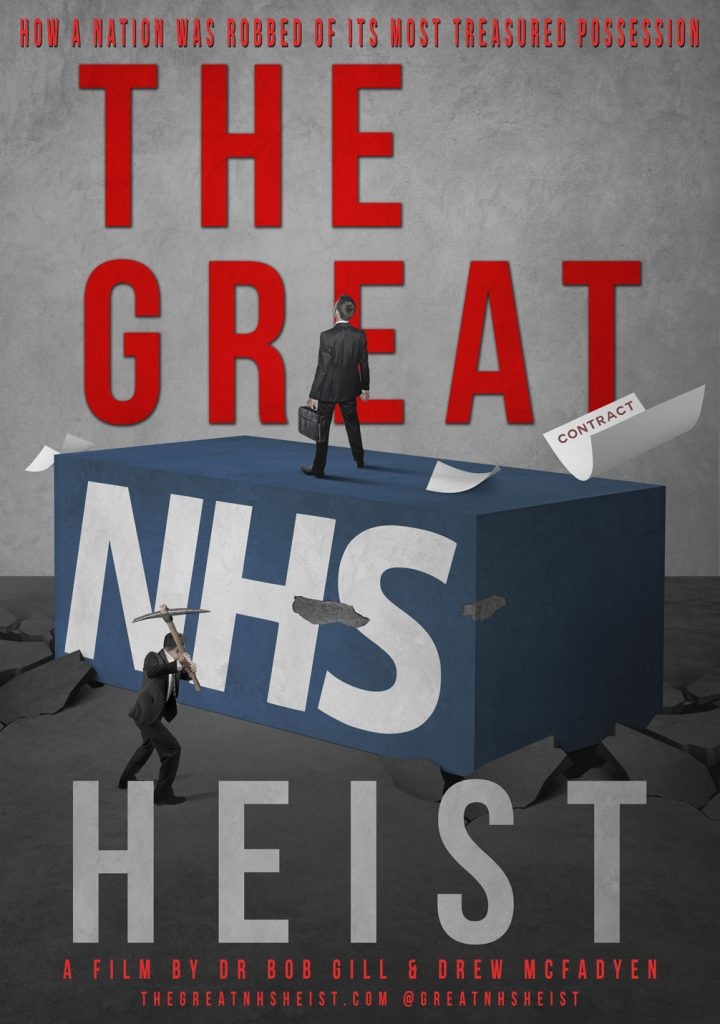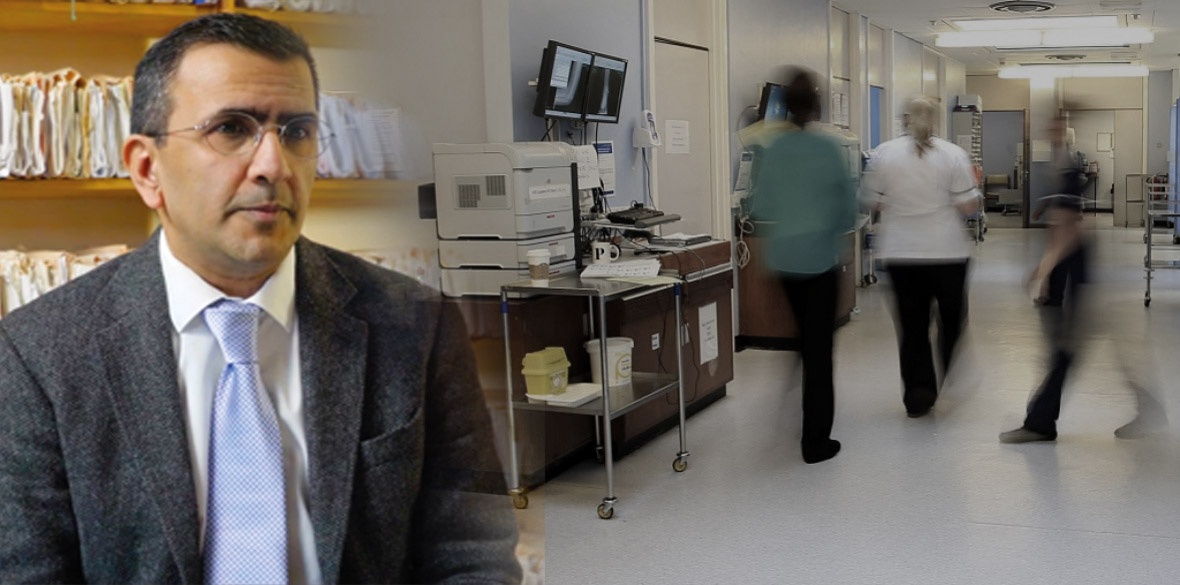This is the last article you can read this month
You can read more article this month
You can read more articles this month
Sorry your limit is up for this month
Reset on:
Please help support the Morning Star by subscribing here
IF you felt aghast at the sight of politicians clapping for the NHS during the peak of the pandemic, you were not unjustified. The government has been discreetly and incrementally washing its hands of responsibility for providing public services since the election of Margaret Thatcher in 1979.
Selling off Britain’s assets was a priority, yet of the NHS: “There’s no way that as an institution so respected and beloved by the population, they could go for a one-off privatisation as they did with other utilities,” says Dr. Bob Gill, producer of The Great NHS Heist film.
A 1977 document from the Conservative Research Group reveals a strategy of “denationalisation by stealth” which would soon come to the most sacrosanct service of all: health.
This began in 1983, with hospital catering and cleaning outsourced to private firms. Citing reports by policy experts Prof. Martin McKee and Lucy Reynolds, Gill explains:
“Studies have shown the incidence of hospital-acquired infections, particularly MRSA, went up as a result of outsourcing, and when services were brought back in house, when the cleaning services are controlled by the hospital, then standards improved, so there’s that direct link with privatisation of a service and dropping of standards, which could have a catastrophic effect on patients.”
By 1988, Conservative MPs Oliver Letwin and John Redwood had authored a blueprint for NHS privatisation coded as “radical reform” of “Britain’s Biggest Enterprise.”
Years later, when asked of her greatest achievements, Thatcher once replied “Tony Blair and New Labour. We forced them to change their minds.”
One such change was the use of Private Finance Initiative (PFI) contracts as a source of investment for the building of new hospitals. These would not show up as government debt, as traditional borrowing methods would have. It also served to avoid breaching EU rules on keeping state borrowing limits within 2 per cent of national budget.
Gill continues: “Anderson Consulting approached New Labour once they were in office and convinced them this was a win-win. They wouldn’t have to borrow any money, it would be off balance sheet and they’d be able to build these shiny new hospitals, which is electorally very good.”
However, the profit-hungry PFI-built hospitals became more costly to the taxpayer, yet less efficient. Even worse, the scheme provided protection that enabled them to cover their debts by swallowing up and selling off publicly owned NHS hospitals, by merging them into trusts.
“In the case of Queen Mary’s Hospital, which used to be a standalone hospital, it became part of South London Healthcare Trust, SLHT, which joined Queen Elizabeth’s in Woolwich with Queen Mary’s and Princess Royal in Bromley. So these three trusts were merged. Princess Royal and Queen Elizabeth’s hospitals had PFIs, so were protected — and Queen Mary’s, which was debt free, was sacrificed.
“By merging the trusts, they brought them all into one entity and then said, why don’t we free up the land and the capital to service our debts? The original hospital built by PFI is protected by its debt. And how do you service the debt?
“By selling off NHS assets, on which there is no debt. They chose to saddle the NHS with these huge liabilities. But that’s no accident — you needed the financial millstone of PFI to let those debts become unsustainable and use that as a justification to flog off NHS land.”
In an incredibly alarming manoeuvre by David Cameron, the Health and Social Care Act 2012 passed through Parliament contained a scandalous legal revision of health provision, as Gill describes.
“The 2012 Act is 500 pages of competition law, written on behalf of the City of London by corporate lawyers — not drafted by any politician. There was a clause to remove the duty of the secretary of state to provide, which is a fundamental foundation of the NHS.
“That duty to provide was gone, replaced with a duty to promote, which has very little meaning in law. You cannot take the government to court for not providing medical service any more. So the legal status of the NHS was effectively abolished in 2012.”
Fast-forwarding to 2018: Theresa May proclaimed in the Commons that “the NHS is not for sale and it never will be,” despite 700 plots of land or buildings being identified for sale, as Gill’s film depicts.
“The other clip we use is Matt Hancock saying there will be no privatisation on his watch, which is definitely not true, because privatisation includes outsourcing and as we’ve seen with Coronavirus, rather than putting money in public infrastructure they have outsourced the whole shebang.”

In the digital age of healthcare provision, the latest public source of private profit is patient records, with data becoming a commodity sought after by corporations in a wild-west type scramble.
The Health and Social Care Act has been shown to enable the non-consensual sharing of patient data, and in 2016 Google acquired 1.6 million records from the Royal Free NHS Trust unlawfully, subsequently being fined by the Information Commissioner.
“There’s a fundamental breach of trust when patients tell doctors intimate details regarding serious diagnoses. They only expect people who are going to be dealing with their care to have access to that information, but to know large multinationals like Google also have access to that information, in a way that can be used to identify individuals — that’s not how they entered into the doctor-patient relationship.
They enter with confidence that this data would only be used for their benefit, in their care, not for commercial companies – without even remotely being involved in the delivery of care — to exploit. It’s using your illness to generate profits for somebody else.
“Big companies like Google are quite happy to pay small fines, they see it as part of their operating risk. If the fine represents a tiny proportion of the profit stream, they’re willing to take that risk. The problem is, the Information Commissioner lacks the teeth to be a real deterrent to this sort of activity.
“The people in charge of the trust who allowed this to happen faced no sanction — in fact the chief executive of the Royal Free went on to get a knighthood. There seems to be no risk in doing things that are unlawful in terms of your career if you are in senior management in the NHS.”
A key strategy of the reorganisation of the NHS to suit corporate needs has been the introduction of a bloated administration with a managerial ethos geared towards generating profits under cover of ‘private-sector efficiency’ rather than patient care.
Gill had personal experience of this in a shocking encounter with an interview panel when applying for a role in a GP Clinical Commissioning Group (CCG), which exposed “how deep the rot goes,” as he recalls.
“I was asked a whole series of questions that seemed to imply I’m a bit too caring and a bit too patient-centred, but this one took the biscuit — and it was from another GP, a panel of three people, who asked me if I would do something I would consider morally repugnant if the board asked me to do so.
“I took a gasp of air, immediately thought ‘I wish I’d recorded this interview’ — and then pretty quickly, a fellow panel member interrupted and watered down the question: how would I feel about trying to persuade members of the CCG to do something that I didn’t believe in?
“My answer to that was, I would set out what the plan was, but these are intelligent people who can make up their own minds. I don’t see any reason to mislead them. And if we want to do something in the best interests of our patients, I wasn’t prepared to lie to achieve an organisational goal. That is one example of how the whole system has been corrupted.
“In another meeting, I was asked to produce a case for change for diabetes services. And I asked, well how do I do that, am I allowed to speak to other GPs? No, because there’s a potential conflict of interest, they may be bidding for the contract. Can I speak to the local consultants who know the system who know what the problems are? No, because they might also be bidding for the contract.
“So I said look, I don’t have a problem with the existing service, what do you want me to do? — ‘Can you make up some cases, which show that the service needs to change?’ — That’s what’s going on. That’s how our NHS is being trashed, by these organisational structures finding timid, aligned or corrupt clinicians to rubber-stamp what they want to do.”
The decades-long NHS sell-off and dismantling was bound to have grave repercussions in the event of a global pandemic, and so it arrived this year with the Coronavirus. Yet scenes such as nurses resorting to the use of bin-liners due to PPE shortages could have been prevented, had warnings been heeded.
“In 2016 there was Operation Cygnus, which was the government’s exercise to look into how prepared the country was for a pandemic. That hasn’t been made fully public, but what is known is that they identified inadequate PPE stockpiles, inadequate number of intensive care beds and not enough ventilators.
“What did the government do? The government chose not to act. They chose not to rectify those deficiencies. They chose not to prepare. And in doing so, they prepared to fail.
“From 2008 to 2019, the NHS bed capacity had dropped by 38,000. So you have an inadequate publichealth system, significantly downgraded, a workforce that was on its knees through austerity, 40,000 nurse vacancies, 10,000 doctor vacancies, inadequate intensive-care bed capacity, in a system that had been defunded over a decade and struggling to cope. And that’s how we entered the pandemic.”
As a final note, Gill encourages all to abide by prescribed safeguarding measures for Covid-19 and to become active in creating awareness around the extent of The Great NHS Heist.
“Take it seriously, take precautions, wear a mask in large groups, wash your hands, push the levers of power to put in place a robust testing-and-tracing system because that still isn’t there. Watch the film — we all have a duty to speak up, mainstream media isn’t explaining this to the public.
“So sharing information, getting involved in local campaign groups if you can and becoming an advocate for protecting the NHS and reversing privatisation in any form you can. Getting on to social media, engaging with local and national radio, picking up the phone to family and friends, use any opportunity to raise awareness.”
Find out about Dr Gill’s crucial new documentary at www.thegreatnhsheist.com and http://mstar.link/NHeist.
Join the campaign to defend public services at www.weownit.org.uk.










